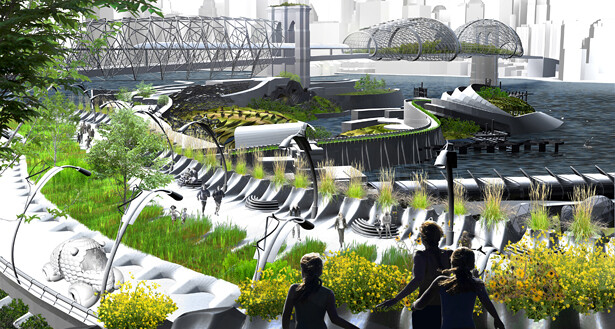New master programme: call for applications
Submission deadline: 14 September 2012
[email protected]
www.dieangewandte.at
Social Design – arts as urban innovation
Both our society and the art system are in transition. Therefore, it is imperative that a university of art must help to shape this paradigmatic process of transformation rather than suffer from its effects. With Social Design the “Angewandte” has gone on the offensive with a fresh approach. We are not producing human capital, we are provoking change.
Urban environment
Today, more than half of the world population lives in cities, and according to UN reports another 200,000 people arrive each day. In the next 20 years, cities around the globe will expand by 1.5 million square kilometres and in 25 years two-thirds of the world population will live in cities. In this global event we can identify the triggering factors behind tremendous restructuring processes: the transformational power of the industrial and digital revolution. This development places cities as complex, self-generating environments under enormous pressure. Through the densification and concentration of the population, economy, capital, and media, as well as culture and knowledge in urban agglomerations, both their spatial and social fabric are subject to overproportional stress.
Social design
In order to account for this global development, new concepts are needed that address the overall process of knowledge production in society. Art universities especially are predestined to formulate these new, distinct perspectives on the inherent logic of cities and the corresponding dynamics of their processes. Artistic research can generate links between multifaceted disciplinary expertise and the problems posed by the urban realm.
The University of Applied Arts Vienna (Angewandte) in cooperation with the Konservatorium Wien University (KONS) have therefore implemented a new master degree programme dedicated to these challenges that emerge within urban social systems and the broad spectrum of related issues. The shaping of reality viewed on the example of urban agglomerations and contrasted with the urban context of Vienna initially forms both the field of work and the scale for the realisation of the individual projects.
Transdisciplinary programme structure
A new type of programme structure has been developed to realise these ambitious goals. The programme places the respective (study) project at the centre of an international teaching environment constituted specifically for each project. Different artistic and scientific experts are assigned as teachers in diverse constellations tailored to the respective project’s requirements and are involved in its development. The objective of the programme is to integrate diverse disciplinary expertise when dealing with the complexity of urban systems. To this end, it is not theoretical discourse that serves as the pretext rather the direct reference to urban reality underpins the project work.
The master programme is oriented towards graduates from diverse fields of study, thereby stipulating work in transdisciplinary teams as the central teaching and learning approach in the programme. On the basis of professional competences acquired in their respective previous studies, students become acquainted with transcending disciplinary codes and thinking and working in greater interrelationships. Art in synergy with project-related scientific methods and knowledge is seen as a tool for urban innovation. The academic principle of research-oriented teaching is further enhanced by cooperations with non-university institutions.
All information about the master programme, its leading team, the entrance exam, the curriculum, the info folder, and more can be found here.
Available: Winter semester 2012/13
Duration: 4 semesters
Head of Programme
ao.Univ.-Prof. Arch. Mag. arch. Anton Falkeis / Expertise Chair / University of Applied Arts Vienna
Univ.-Prof. Dr. Susana Zapke / Vice Chair / Konservatorium Wien University
*Image above: Mitchell Joachim and Maria Aiolova, Terreform ONE & Planetary ONE.
Image sub-text: Rendering of Waterfront Parks, 2010 / winner project of the „Design for the Real World REDUX. An International Social Design Competition”, 2011.


